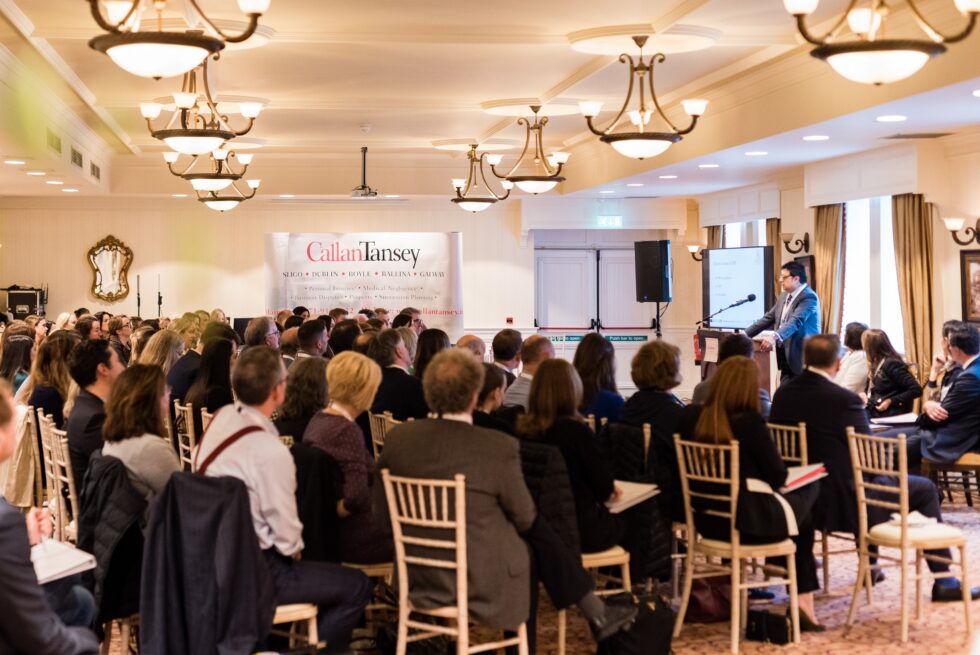Our 2023 Pathways to Progress Conference was held recently at Mount Falcon Estate in Ballina. The theme this year was Neurological Injury and the Law. Attendees at the event, which was sold out, heard a range of expert speakers and panelists from Ireland and overseas address four key topics related to Neurological Injury and the Law. The event opened with Joint Managing Partner Niamh Ní Mhurchú welcoming attendees before introducing Ingrid Miley BL who was Moderator for the conference.
Neurological Injury at Birth
The first Module considered Neurological Injury at Birth and the keynote speaker was Mike Monroe, Consultant Neonatologist at Aberdeen Maternity Hospital. His presentation addressed the four main causes of Neurological Injury at Birth:
- Toxic metabolic factors
Inborn errors of metabolism (IEM) constitute a huge group of rare diseases affecting 1 in every 1000 newborns. Whilst appearing normal at birth, problems arise due to the accumulation of substances that are toxic and infants can present with significant non-specific signs and symptoms common to other serious medical conditions.
- Birth Trauma
Birth trauma is differentiated into Spontaneous (arising during childbirth) and Obstetrical (caused by obstetric interventions). It involves various mechanical injuries including fractures of the skull bones, rupture of the tentorium of cerebellum, falx, veins, and sinuses. It can also involve crushing, compression, and impaction of the brain along with various disorders of cerebral circulation.
- Infection
Including congenital infection, chorioamnionitis, and neonatal infection
- Asphyxia
Perinatal asphyxia is a lack of blood flow or gas exchange to or from the fetus in the period immediately before, during, or after the birth process
For the panel discussion that followed this presentation, Mike Munroe was joined by David O’Malley, Joint Managing Partner at Callan Tansey Solicitors LLP, Doireann O’Mahony BL, and Johan Vergruggen, Associate Solicitor at Callan Tansey Solicitors LLP.
Neurological Emergencies
The keynote speaker for the second Module was Roger Murray SC, Partner at Callan Tansey Solicitors LLP. His presentation addressed Neurological Emergencies, specifically
- Stroke – studies show that stroke accounts for 59% of neurological diseases in patients attending at Emergency departments and that the most common reason for litigation in the context of stroke is a failure to identify or diagnose a stroke and these failures account for 67% of cases brought.
- Subarachnoid Haemorrhage – The majority of Brain haemorrhages are of the result of bleeding from a ruptured aneurysm. Very often the initial headache, if there are successive headaches, is less severe and this can constitute a sentinel or warning bleed. It is the failure to react to this window of opportunity that most likely gives rise to litigation.
- Spinal Cord Compression – Spinal cord compression can cause quadriplegia or tetraplegia. The most likely medico-legal circumstances giving rise to potential litigation is a delay in diagnosing the presence of impending or incipient neurological damage.
After his presentation, Roger Murray was joined by Donald Campbell, Consultant Neurosurgeon and Spinal Surgeon, Dr Kevin Power, Partner and Head of the Health Care Department at Mason Hayes Curran LLP, and Noreen Roche, Nursing Consultant, Ergonomist, Safety Adviser, and Expert Witness for a panel discussion on Neurological emergencies.
Medical Negligence Litigation
Following a break for lunch the conference reconvened to hear a presentation on Medical Negligence Litigation – The Need for Reform from keynote speaker Satinder Hunjan K.C. His presentation addressed Adversarial vs. Inquisitorial systems of resolution as well as Alternative Dispute Resolutions. He explored the advantages and disadvantages of a Court system compared to Alternative Dispute Resolution. Other issues considered included whether the ultimate goal was to achieve justice, or if the goal was to achieve the best justice that could be achieved expeditiously and at a reasonable cost.
The panellists who joined Satinder Hunjan after his presentation for the panel discussion were Niamh Ní Mhurchú, Joint Managing Partner at Callan Tansey Solicitors LLP, Tadhg Dorgan BL and Kathleen Byrne, Partner at Carson McDowell Solicitors.
Assisted Decision Making – a Clients Perspective
The fourth and final Module was titled Assisted Decision Making – A Client Perspective. Hilda-Clare O’Shea, Partner at St. John Solicitors was the keynote speaker. She has a special interest in Mental Health and Capacity law. Her presentation looked at the objectives of the Assisted Decision-Making (Capacity) Act, 2015 and the changes to existing processes and procedures that it would introduce. She outlined the 8 guiding principles of the new Act as well as the key changes that could be expected in practice.
Following her detailed presentation Hilda-Clare was joined by Christopher Callan, Partner at Callan Tansey Solicitors LLP, Rory Murphy Director of Financial Planning at Davy, and Olivia Harte, mother of Jane Harte. Ms. Harte spoke about what life has been like for the past 27 years as the mother of a daughter with Cerebral Palsy. She spoke of the impact not only on Jane’s life but also on that of her parents and the wider family, the long and difficult journey to achieve the High Court settlement of €12 million, that will now enable the family to provide Jane with the quality of life she deserves.
In closing remarks David O’Malley, Joint Managing Partner, thanked everyone for attending and for the care and attention speakers had put into preparing their presentations, the attention given by the attendees and the way they engaged with the subject matter posing so many thought-provoking questions. He stated that in starting the Pathways Conferences in 2017 Callan Tansey Solicitors LLP had wanted to establish a non-adversarial forum where medical professionals, defence and plaintiff lawyers, and other stakeholders could meet and address and discuss the issues that impacted all of them. He particularly thanked Olivia Harte for traveling to attend the conference and for the very open and frank way she spoke about the experience of Jane’s birth, diagnosis, and subsequent care. He reminded all attendees that these are the people they all do their work for, the patients and their families, and to never lose sight of the people at the heart of the legal case.


